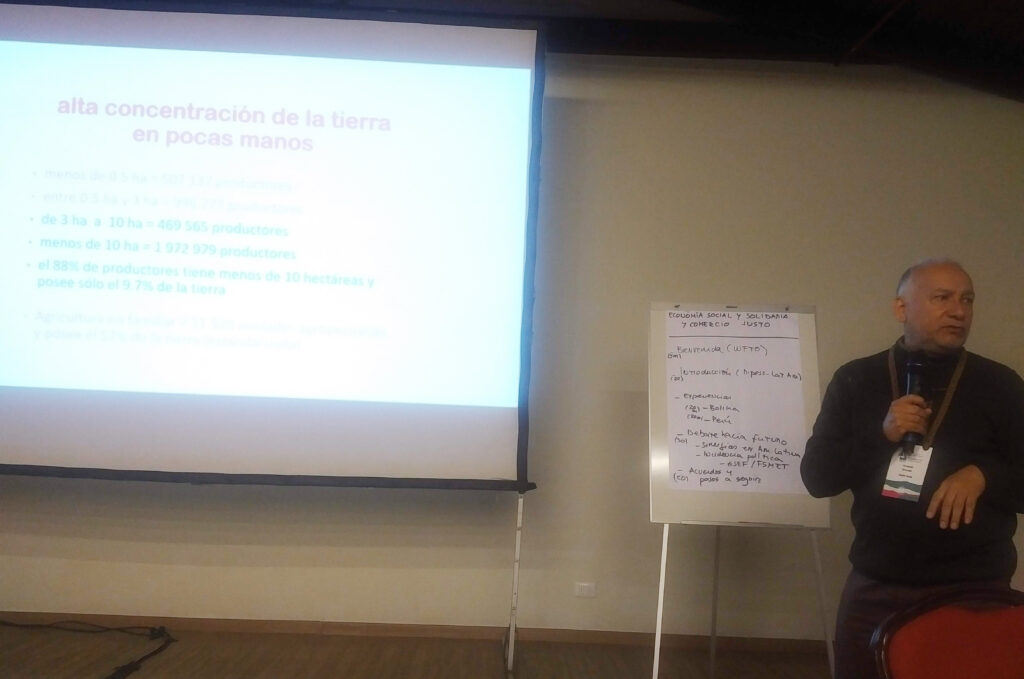From September 16th to 18th, the city of Lima hosted the 15th International Fair Trade Summit, organized by the World Fair Trade Organisation (WFTO). RIPESS and WFTO organised a workshop on SSE and Fair Trade.
Written by Alfonso Cotera, RIPESS LAC Technical Secretary
From September 16th to 18th, the city of Lima hosted the 15th International Fair Trade Summit, organized by the World Fair Trade Organisation (WFTO). During the conference, WFTO’s director, Erinch Sahan, and RIPESS Intercontinental’s coordinator, Jason Nardi, jointly organised a workshop on Social Solidarity Economy (SSE) and Fair Trade. The aim was to share reflections on the existing links between the two movements and look at joint approaches, strategies and actions.
Delegates from Latin America, Africa, Asia and Europe attended the workshop held on September 18th where two topics were discussed: firstly, the approach and strategies developed with the connection between SSE and Fair Trade in Latin America and the Caribbean. And secondly, the discussion on the possibilities for joint cooperation between the two movements.
In the first part, as RIPESS LAC Technical Secretary, Alfonso Cotera presented SSE as a school of thought and action that seeks to direct economic activity to serve people in harmony with nature. This practice has been applied since time immemorial in communities, then in cooperatives and various associations, as a way of taking care of needs and not only of accumulating profits. SSE uses this perspective to integrate the Fair Trade movement as one of the strategies that aims to integrate justice and solidarity in economic exchange, as well as other strategies related to solidarity finance, responsible tourism, ecological and sustainable production, sustainable economic development, etc.
He also explained the articulations of these experiences in various networks, in which Fair Trade organizations have been integrated into various solidarity economy organizations, highlighting the emergence of RIPESS (Lima 1997), the Latin American Fair Trade Coordination Table (Lima 2004) and RIPESS LAC (Cochabamba 2005). As well as in the promotion of South-South and North-North Fair Trade as alternatives to develop local markets with the principles of solidarity, justice and economic democracy.
This was followed by Alicia Canaviri, President of the Bolivian Movement for Solidarity Economy and Fair Trade, who presented the Bolivian experience in articulating both movements since the Cochabamba meeting where RIPESS LAC was created (2005). She explained her long struggle for the recognition of community work and the Andean cosmovision as actors in the development of the Good Life (buen vivir), recognized by the Bolivian Constitution. She mentioned the progress and difficulties in the action of political impact to gain recognition for an explicit standard for Fair Trade and solidarity economy, stating the need to integrate the experiences of Fair Trade into a solidarity economy approach and proposing the need to create local Fair Trade certification.
Fernando Alvarado, President of the Peruvian Agroecological Consortium, and Silvia Wu Guin, Head of the Peruvian Biomarket Network, both members of the Peruvian Fair Trade and Ethical Consumption Network, made further interventions. Fernando presented an analysis of the context of the global food market, of which 10% are organic foods and where demand is increasing. He denounced the fact that in Peru, two million people suffer from hunger and 13% of children under 5 years suffer from chronic malnutrition. He also highlighted the importance of family farming in Peru, in particular organic production (93,000 producers with 550,000 hectares certified), as well as the increase in organic fairs and sales outlets (150).
On this basis, Silvia presented the Peruvian Biomarkets as a network that seeks to ensure that consumers have access to guaranteed healthy products and that bioproducers are valued and have stable incomes. She also expressed the importance of having local governments as allies to implement citizen development and public health policies. The network allows sharing experiences and the implementation of a certification and participatory insurance system. She briefly recalled the main fairs and contributions to the construction of a solidarity society, summarized in the sentence “we must contribute to the development of a SOCIAL FABRIC woven in solidarity and fraternity”.
In the second part, Sergi Corbalan, WFTO advocacy officer, encouraged dialogue between participants, noting that in Europe there had been progress in RIPESS-WFTO relations, with better mutual knowledge, a system of guarantees, policy impact actions and proposals in the political campaign. At the end, several conclusions were adopted that pave the way for a joint work programme:
- Continue the joint work between RIPESS and WFTO to create synergies and identify issues of common interest at the local, regional and international levels.
- Coordinate advocacy work with multilateral, regional and national institutions, where possible
- Share information and possible advocacy actions in co-managed spaces and/or platforms, such as the GSEF process (Mexico 2020) and the WSFTE (Barcelona 2020).






Leave A Comment